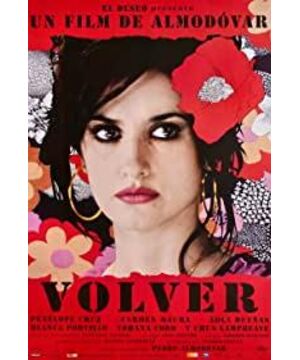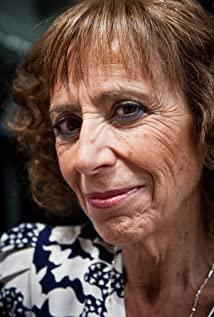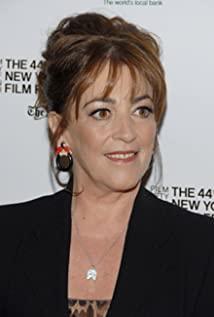a "return" opening
Mancha whistling kind of mixed hot air suffocating crazy, between slowly moving across the lens inadvertently covered with dust tombstone. Under the bright sunshine and brisk music, women are cleaning the cemetery peacefully. When they occasionally raise their heads, a cordial and friendly greeting conveys the infinite peace of mind. Augustine said: "Every time I clean my cemetery, I always feel very peaceful. I always come here alone, sitting quietly, forgetting all my troubles." The man is absent here, Al From the very beginning, Modova clearly showed what he wanted to express: women and death. This is similar to his early movie "The Passion Labyrinth". From the very beginning, in the ambiguous music, the camera was aimed at the lower body of the pedestrians of all kinds coming and going on the street, full of provocative and deformed sexual meaning. Of course, this is just the similarity in expression, changing from radical and uninhibited underground movies to relatively mainstream movies that are mixed with melodramas, gay sex comedies, etc., especially after "All About My Mother", Almodovar's images It is becoming more and more tender. Whether it’s "Tell her", or "Bad Education", or "Return", after the tragedy, people can always find hope, the weak heart can always be comforted, and the audience is experiencing it. After the absurd and profound world created by Almodovar, it is inevitable to shed tears of touch and tolerance. For example, the little Esteban who finally developed AIDS antibodies in "Everything About My Mother", such as Enrique who continued to struggle in the directorial career in "Bad Education", and Lehmanda who still lives tenaciously in "Return". Perhaps in Almodóvar’s eyes, life is tragic, but after the storm, we are still moving forward...
Almodóvar has always been good at piecemeal patchwork, imitation and self-deprecating humorous plot processing. The cartoon-like characters and the fantasy-like plot effectively dispelled the audience’s inherent ethics and morality, allowing people to have a sincere understanding of what is unacceptable under normal logic. Almodovar has a kind of character and phenomenon in the movie. The extremely ambiguous attitude of tolerance, murder, kidnapping, incest, sexual disorder, homosexuality, etc., under his handling, has an unexpected ironic effect. As Thompson and Podwell said: "Almodóvar often uses a relaxed, easy-to-please approach to the audience to deal with scandal-entangled situations and images in movies." Almodo can still be seen in "Return." Wa's increasingly skilled skill, in the rich Spanish-style pictures and patchy rhythms, narrates a weird, gorgeous, deadly and humorous story. Under the endless chatter, the characters' sorrow, happiness, and tenderness are exhausted. Significantly in the meantime.
Almodóvar’s changes can also be felt here. Compared with his previous works, "Return" is obviously more gentle and calm. The director seems to avoid all unpleasant and offensive scenes, and the color has become much brighter and single. However, the red color is still impressive. Before Parker was killed, there was a transition shot of a blood-red screen. It vividly explained the anxiety and anxiety of a tragedy, just like the photographer in "Kika". When Meng's mother was killed, the sudden gunshots suppressed tension and made people wonder. In addition to creating a strong visual impact, the color here also seems to be a metaphor for the grotesque problems that exist in a seemingly peaceful society. When it comes to "Return", it should refer to the women and men and women caused by the patriarchal society. Time and the tragedy of men.
In terms of narrative, this film obviously has to be more restrained. It is different from the multi-line structure of "The Woman on the Brink of Mental Breakdown", and the narrative style of "Bad Education" which is layered and the reality reflects each other. "Return" is basically in the same time and space. Unfolding, six heroines enter and exit the stage designed by Almodovar. This group drama is somewhat similar to Almodóvar's early "Biography of a Heroine", "Passion Labyrinth" and "Dark Habits", except that the sharpness of the past is long gone, and what settles down is a watery gentleness. "Return" may be regarded as another collection and discarding of Almodóvar's previous films, which may also be part of the implicit meaning of the title return.
2. Desperate Housewives: Why should I be so fate?
Part of the plot of "Return" has already appeared in the novel of the female writer Leo in "My Secret Flower". Both films describe the few women who travel between the city and the country, and both happen to be at a certain level. The above constitutes a complementary relationship, which will help to deepen the understanding of Almodóvar’s influence on the world in contrast to appreciation. In "The Flower of My Secret", Leo's mother referred to the newly divorced Leo as "the cow with the missing bell", which is a state of hesitation and boring loss. And this is exactly the situation that Lehmanda is experiencing in "Return". Her husband attempted to rape her adopted daughter and was killed, making this already distressed woman even more helpless. In order to protect her daughter and maintain the mother-daughter relationship, she is willing to take all charges. Although Almodovar tried his best to use a ridiculous method to dilute the tragic atmosphere of the film, the difficulty and bitterness in it can still make people infinitely emotional. In a patriarchal society, women tend to succumb to male values and are in a position of subordination and attack. Almodóvar’s films are an anomaly. His images have a kind of care for women and those who desire to become women. Even the attitude of worship. From the first movie "The Legend of the Fierce Girl" to "Everything About My Mother", all kinds of women shuttled between them, weak, strong, indulgent, perverted...everyone is extremely individual. This also contains Almodóvar’s acrimonious irony to society. Sex is often mentioned by Almodóvar, and resistance to sex seems to be one of the means for women to get rid of the abuse. In Matador The female lawyer who held the silver hairpin and strangled the man in the climax is one such kind. "Return" expresses this more clearly. The tired Lehmanda unceremoniously rejected her husband Parker's sexual demands, and Parker The sexual harassment of adopted daughter Paula did not succeed like the laundrette owner in "The Passion Labyrinth", but was tragically killed. Almodóvar insisted on creating a world of women, where they took all responsibilities, including Heavy tasks such as driving, carrying, haircutting, etc.
However, in a world without men, the pressure of patriarchy is still omnipresent. The tragedy of the film originates from two tragedies. The perpetrators are all men, and they are both in the authority of the father. The first scene is the content mentioned above, and the second scene is through the mouth of Lehmanda’s mother Irene. Lehmanda had also been sexually assaulted by her father when she was a child, and she was pregnant with her daughter Paula. It's like a nightmare reincarnation. The image of Lehmanda is like Gloria, the housewife in "Why Should I Be Fate". On the one hand, she must cover up the truth for her daughter and maintain the operation of the family. On the other hand, she has been living in the shadow of her childhood. Brooding. At this time, Aunt Paula, who cared for her the most, passed away, and it was even worse. The stronger she pretended to be, the more depressing and sad she felt. In fact, the women in the film have been living in trouble. Lehmanda’s lonely and divorced sister Sorya, Irene who lives like a wandering soul, and Augustina who is suffering from cancer, all have their own reluctances. Known pain. They deceive, conceal, and misunderstand, looking for the little taste of life in a seemingly humorous environment. The women in Almodóvar’s images have always been flawed, and these flaws are forgivable and even indispensable. Together, they show the scarred souls of the era of appearance.
However, Almodovar is obviously unwilling to let tragedy dominate the whole film of "Return". The different endings of the two murders express to a certain extent the awakening of female independence consciousness. Even if there are no men present, we can still see them living hard and hard, facing difficulties, facing diseases, facing death...
3. Motherhood and tenderness
In the bleak and deserted countryside, women in black gathered together and talked a lot. Aunt Paula has passed away, and the image of mother in the film is temporarily missing. People say that the souls of Lehmanda and Soria's mother Irene have returned. She took care of Aunt Paula until the last moment. Almodóvar creates a situation that is absurd, humorous and slightly gloomy, which naturally leads to Irene's story, which entangles the emotions of three generations of women. When talking about the meaning of return, Almodovar said: "In a sense, I returned to comedy; I returned to the world of women; I returned to my hometown of La Mancha; I returned to the role of life and the source of the story. "In my opinion, the most important and direct meaning of the return is the mother, or to be precise, the return of the motherhood to the daughter's life. The return also brings the meaning of compensation and reconciliation. The mother has always been a tolerant and tender image in Almodovar’s images. Except for the image of Ingres’s indifferent and ruthless mother in "The Bullfighter" to satirize religious education, Almodovar has always been cherished by his mother. There is a deep love, just like Leimanda in "Return" with tears in his eyes, holding Irene tightly: "I need your mother, I always need you." In "High Heels", there has always been a lack of love for her daughter. The mother charged her daughter for murder before she died, so that the mother and daughter could be reconciled. When it came to "Return", Almodovar strengthened this point, so there is an absurd plot of the reappearance of the dead mother, which will inevitably allow the emotions between mother and daughter to be further exchanged and communicated. Almodovar did not intend Entangled in a ghastly soul story, he just makes people who think they are alive die, and lets those who think they are dead continue to live. What this conveys is exactly a kind of ironic effect that makes people laugh or cry.
Irene said to Soria, "You are divorced, and it is better to live with your mother. Unless you have another man." "No, mother. I'm still alone, as usual." "It's not anymore from now on. "This is exactly what Almodovar wants to say. The mother returns and love returns. Since then, her daughter's life is no longer lonely. When she wakes up from night dreams, she came to her mother's bed like a child, full of gratitude and tenderness. . Like Almodovar’s other films, music plays a very sensational role here. When Lehmanda hummed the songs her mother taught her when she was a child, the mother and daughter had reached a spiritual reconciliation, and the misunderstandings of the past had faded. go. The appearance of three generations at the same time just made up for and perfected the female image portrayed by Almodóvar. In fact, all three generations of women can see their shadow through each other. Irene said that when she returned, she sought her daughter’s forgiveness and made up for her mistakes. This may be why Almodóvar made the women talk about the return of their souls. In this world, there is always something to worry about. In the heart, never leave.
The image of Augustine contains Almodóvar’s deep attachment and love to her mother. When her mother disappeared, she took care of her neighbor, Aunt Paula, until she organized the funeral. Augustina's greatest wish is to find news of her mother before she dies. She hopes that in a certain corner of the world, someone will treat her mother like she did to Aunt Paula. Regardless of whether the final wish is realized or not, she has an understanding and tolerant attitude towards others. For example, she is unwilling to reveal the information of her mother's rival, which is Irene's information, and angrily leaves the talk show, even though the TV station promised to fund her travel to Houston for cancer treatment. Augustine said: "I would rather die with peace of mind than to have no place in front of you (the Lemanda family)!" This is exactly Almodóvar's attitude, because no matter what kind of grudge between women, it is just them. "Your own business" has nothing to do with others. Although there were contradictions and tragedies in "Return", everyone was finally understood and forgiven, including the dead Parker. At the end of the film, Irene came to Augustina's house to be her mother and accompany her to the end of her life. During a journey, everything is only warm, and everything is infinitely calm.
View more about Volver reviews










